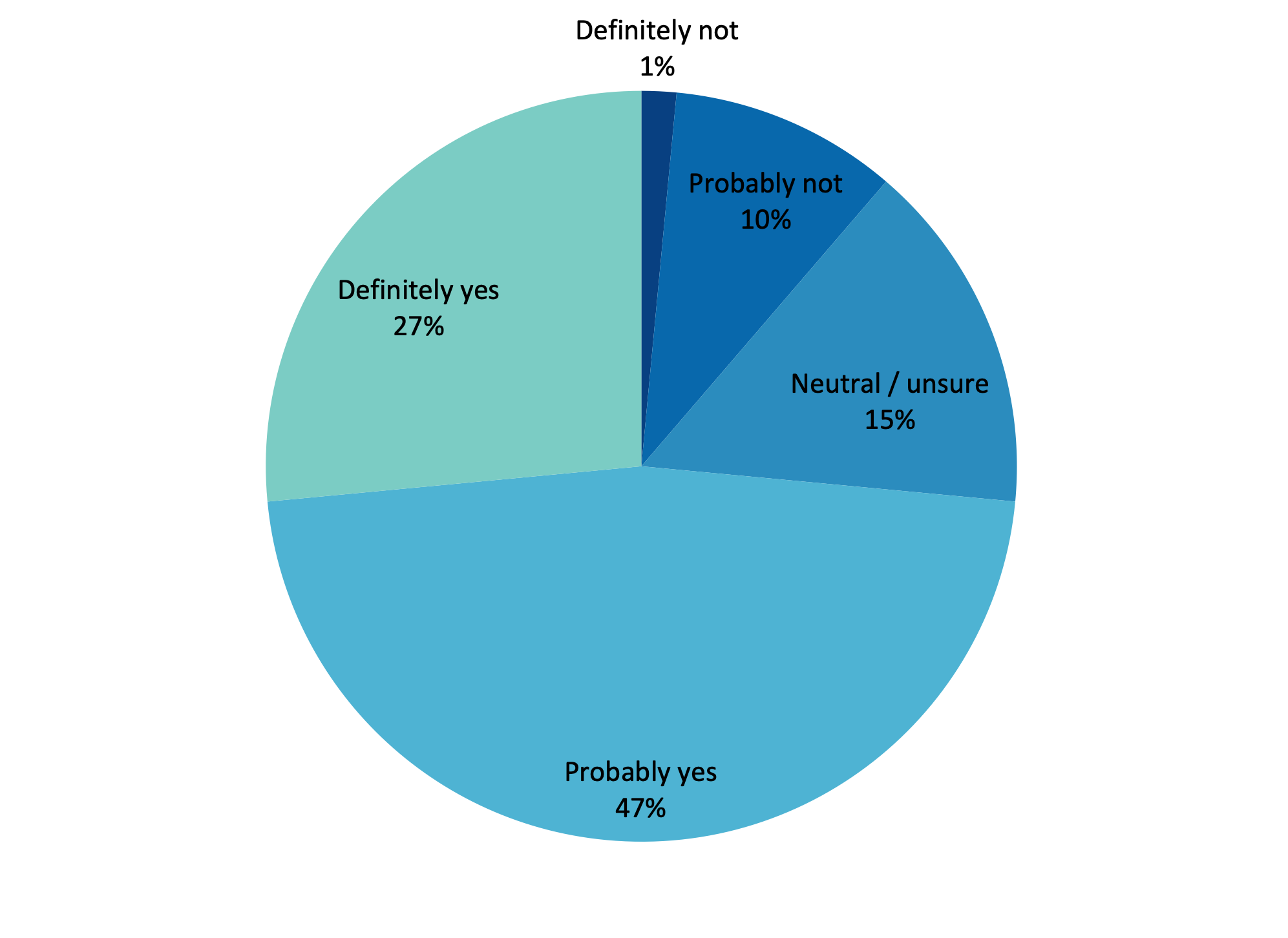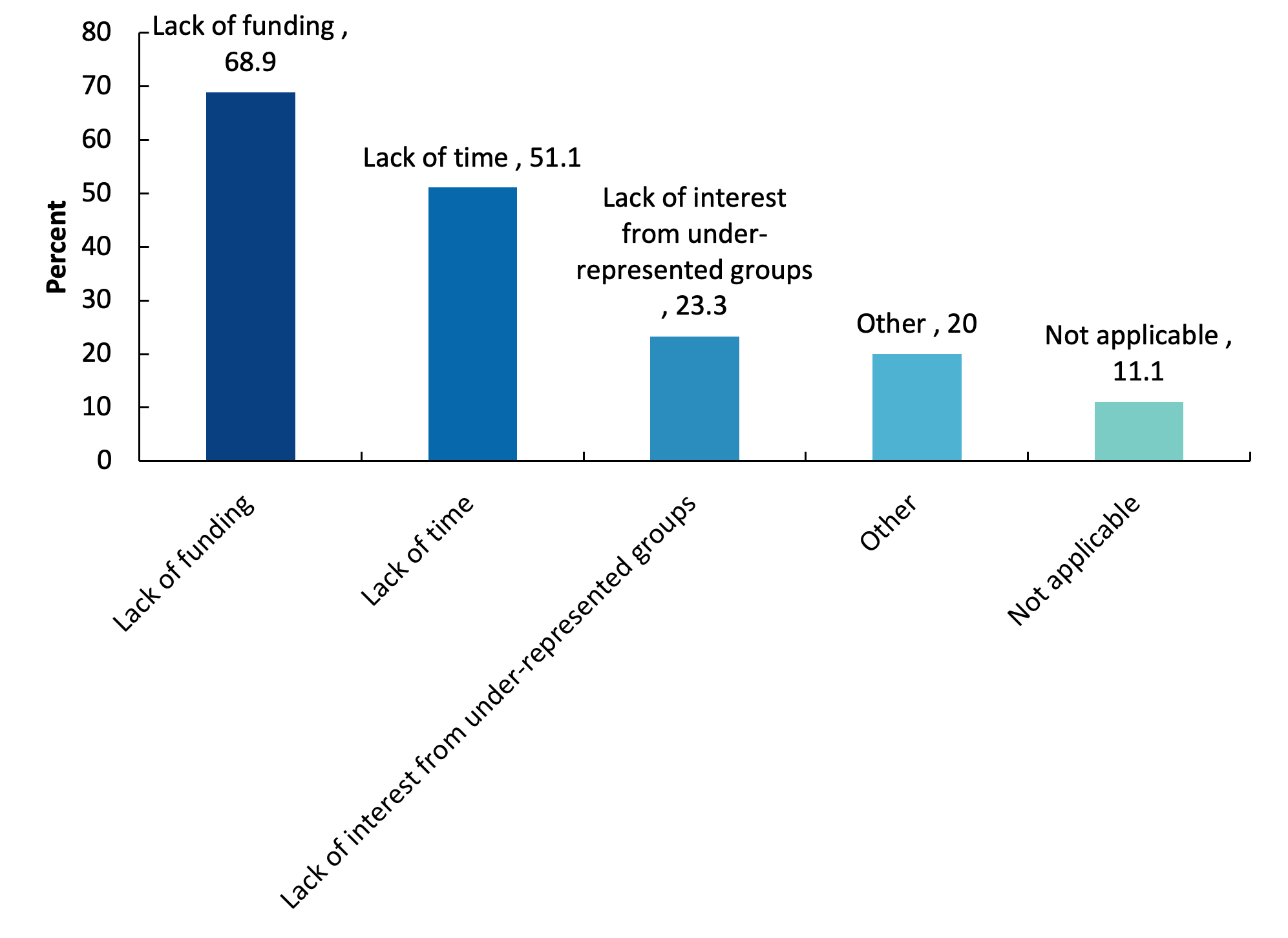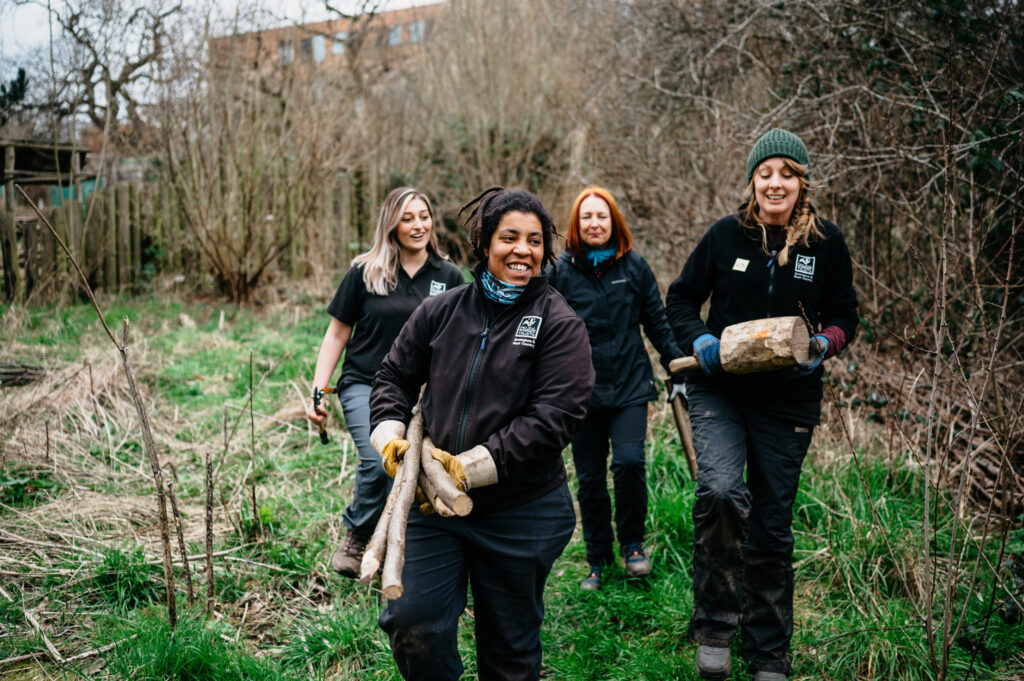Results from September 2024 Panel Research
In September, a total of 205 UK Heritage Pulse panel members responded to at least one part of a two-part survey. Part one consisted of questions on how the sector is breaking down barriers to opportunity. The survey explored access to career paths for people from all backgrounds, together with a closely related issue – approaches to equality, diversity and inclusion. Part two of the survey was the first of an updated edition of “Pulse Monitor”, questions which track the individual and organisational resilience of respondents. These questions which were previously asked quarterly are now being put to the panel monthly.
Careers in the heritage sector
Leaders in the sector strongly recommend a career in heritage to young people
The survey opened with an encouraging finding – 74% of panel respondents recommend a career in the heritage sector to a young person leaving education today.
We defined young people using the UNESCO definition as being those aged between 15 and 24. 46% of respondents currently undertake initiatives, programmes or events to promote careers in the heritage sector.
Only 1.5% of respondents said that they would definitely not recommend a career in heritage.
Would you recommend a career in the heritage sector to a young person leaving education today?

n = 132
Panel members were given the opportunity to share advice with young people who want to develop a career in heritage, submitting qualitative answers. We used a Large Language Model to identify the sentiments expressed and categorise the answers.
| Positive | 83% |
| Neutral | 9% |
| Negative | 8% |
n = 86
Examples of advice with positive sentiment shared by panel members include:
“Find a part of the sector where you can thrive and be creative – heritage is what you make of it and not what others (established heritage professionals) tell you it – it’s for you to define and make work for you.”
“Go for it. If it’s your passion as well, you will get so much out of it.”
Examples of advice with more cautious sentiment shared by panel members include:
“I would caution them that it’s a sector with, mainly, low pay and little to no structured development so I would encourage them to be prepared to work freelance and to, where possible, create their own opportunities.”
“Make sure you are really interested in the subject to help bolster you while you make it through. It’s no longer properly funded, and it will be difficult otherwise to sustain. It helps to be independently wealthy.”
When controlling for turnover of respondents’ organisations, negative sentiment was confined to those with a turnover of less than £1 million
| Sentiment | Turnover less than £1 million | Turnover greater than £1 million |
| Negative | 8% | 0% |
| Neutral | 9% | 0% |
| Positive | 65% | 17% |
| Total | 83% | 17% |
n = 86
Panel members most frequently cite motivation to pursue a career in heritage in their advice to young people; gaining qualifications least frequently
Digging deeper, the advice from panel members to young people followed three distinct types of argument:
- The need to be motivated to pursue a career in heritage, versus the need to be cautious and identify the right opportunities.
- The need to get experience in the sector, versus the need to gain appropriate qualifications for the role you wish to pursue.
- The importance of building a large network, versus the importance of seeking volunteering opportunities in the sector.
We used a Large Language Model to identify the argument that best fit the answer from the respondent:
| to be motivated | 24% |
| to volunteer | 20% |
| to get experience | 19% |
| to be cautious | 16% |
| to network | 15% |
| to gain qualifications | 6% |
n = 86
Examples of being motivated to pursue a career in heritage, versus being cautious and identifying the right opportunities include:
“A career in heritage can be extremely fulfilling. This is not an easy sector, or one that has high wages, but there is real reward in doing work that you find interesting, that you believe matters.”
“Enter with open eyes – the sector is precarious, your job might be too, and the salaries are frequently poor. But there are huge opportunities for a rewarding career, where one learns every day among kind and supportive people, working in organisations that do genuine good in the world.”
Examples of the need to get experience vs the need to gain qualifications include:
“[D]o something you enjoy, get as many experiences as you can, look for transferable skills that you have, don’t dwell on set backs, there will be a role for you somewhere.”
“Future proof professional development aspirations & training by engaging with sector on future needs and the types of roles that sector will need to develop i.e. commercial and digital.”
Examples of importance of networking vs seeking volunteering opportunities include:
“Connect with others and don’t give up. There is a huge appetite from heritage charities to diversify their workforce and board, look out for unexpected opportunities and don’t let a few “noes” stop you.”
“Do it for love and not for money. Really well-paid jobs in the sector are few and far between. Volunteer whenever possible to gain experience, learn what careers are possible and enhance your CV.”
Read more
Read all the advice offered by Heritage Pulse panel members, at
heritagepulse.insights-alliance.com/tag/september-2024/
Many organisations do not currently offer traditional pathways for new career entrants.
We asked respondents about traditional routes into work for people who are in the early stages of their career. Apprenticeships and paid internships are perhaps surprisingly under-represented, with more than 65% of organisations saying they offer neither. However, it should be noted that a quarter of all respondent organisations have no paid employees, and the sample is biased towards smaller organisations generally.
| 0-10 | 1-10 | 11-20 | 21-50 | 50+ | Responses | |
| Work experience | 30 36.1% | 46 55.4% | 3 3.6% | 3 2.4% | 2 2.4% | 83 |
| Apprenticeship | 52 68.4% | 17 22.4% | 7 9.2% | 0 0% | 0 0% | 76 |
| Paid internship | 51 65.4% | 23 29.5% | 3 3.8% | 1 1.3% | 0 0% | 78 |
| Unpaid internship | 56 76.7% | 14 19.2% | 2 2.7% | 0 0% | 1 1.4% | 73 |
| Volunteer | 25 29.1% | 41 47.7% | 8 9.3% | 5 5.8% | 7 8.1% | 86 |
| Staff or freelance role with guaranteed / set hours | 42 56% | 28 37.3% | 2 2.7% | 1 1.3% | 2 2.7% | 75 |
| Staff or freelance role with no guaranteed hours | 53 72.6% | 16 21.9% | 2 2.7% | 1 1.4% | 1 1.4% | 73 |
n = 86
17 organisations reported that they offered unpaid internships – these are generally organisations with fewer than ten paid employees and a turnover of less than £250,000 for their current financial year. Organisations should be mindful of employment rights and pay for interns.
For those young people hired into paid roles, respondents reported that they are most frequently recruited to work in front of house/visitor experience roles (34%), and community engagement/education roles (29%).
Signposts Have you considered whether your organisation could offer
apprenticeships? Find links to more information at
heritagepulse.insights-alliance.com/tag/september-2024/
Respondents strongly support equality, diversity and inclusion
78% (n=117) of respondents believe their organisation is conscious of issues around equality, diversity and inclusion (EDI) in recruiting and retaining staff and volunteers.
56% (n=91) of respondents believe their organisation is more likely to present itself as supporting EDI, compared to two years ago. Only two respondents felt their organisation was less likely/much less likely to present itself as publicly supporting EDI.
In raising awareness of heritage, panel members’ most frequent engagement is with primary schools
We asked the panel “how frequently do you engage with any of the following?” before going on to list different types of community and educational organisation.
Local primary schools saw the highest level of engagement, with 40% of respondents saying they had monthly engagement with these schools. By secondary school, this very high level of engagement has dropped back 12 points to 28%, but rises to 32% for universities. Schools’ engagement is typically in the local area.
| Once a month | Every 2-6 months | Every 6-12 months | Less than once a year | Never | Responses | |
| Local youth organisations | 20 20.6% | 23 23.7% | 15 15.5% | 20 20.6% | 19 19.6% | 97 |
| Local primary schools | 40 39.6% | 15 14.9% | 11 10.9% | 13 12.9% | 22 21.8% | 101 |
| Local secondary schools | 28 28.3% | 18 18.2% | 15 15.2% | 21 21.2% | 17 17.2% | 99 |
| Schools outside your local area | 18 18.4% | 11 11.2% | 11 11.2% | 19 19.4% | 39 39.8% | 98 |
| Nurseries | 7 7.6% | 9 9.8% | 7 7.6% | 16 17.4% | 53 57.6% | 92 |
| Charities supporting low-income people in your area | 20 20.8% | 19 19.8% | 14 14.6% | 19 19.8% | 24 25% | 96 |
| Universities | 32 32% | 25 25% | 15 15% | 12 12% | 16 16% | 100 |
n = 101
Only 20% said they never engage local youth organisations, while 25% said they never engage with charities supporting low-income people.
Respondents say that lack of time and funding prevents engagement with, and increasing access to, underrepresented groups
We asked “What barriers does your organisation face to increasing engagement/access for under-represented groups in your local area?”

n =157
The clearest call for resource to assist in engaging with under-represented groups was for more funding. The National Lottery Heritage Fund provides Good Practice Guidance on inclusion, which features successfully funded projects for inspiration.
Pulse Monitor
Pulse Monitor is a monthly health check on the heritage sector, measuring the resilience of both people and organisations.
This month features the first appearance of some new questions, as well as the return of some questions previously asked.
As an organisation / sole trader

Confidence in ability to respond to cost increases took a small dip in March 2024, but has recovered in September 2024 (up to 5.9, from the previous 5.6), while confidence in the ability to recruit and train new staff or volunteers remains flat at an average of 5.4 / 10.
This month, two new measures are introduced, measuring confidence in surviving the following 12 months, and the level of understanding of objectives and performance. Responses to these questions were less spread out on the scale and closer to the mean, indicating moderate agreement amongst panel members.
Impact

Confidence that the organisation can adequately care for its collection / area of heritage took a dip in March, and has not yet recovered to September 2023’s levels, likewise with the perception that the organisation and the heritage it is responsible for is valued by its community.
About you

The reported stress of panel members increased, rising by over 0.5 points since September 2023. Respondents stating that they wanted to stay at their current organisations for 12 months or more fell by 8.5% on March 2024’s survey.
Appendix A: “What advice would you give to a young person who wants to develop a career in heritage?”
All responses where permission was given to publish:
Find a part of the sector where you can thrive and be creative – heritage is what you make of it and not what others (established heritage professionals) tell you it [is] – it’s for you to define and make work for you.
Express an interest with heritage organisations and look for volunteering opportunities
Gain work experience elsewhere before moving into this sector
A career in heritage can be extremely fulfilling. This is not an easy sector, or one that has high wages, but there is real reward in doing work that you find interesting, that you believe matters. Heritage careers can be very varied and you learn lots of transferable skills as many roles are multi-faceted.
Make yourself ‘visible’ and ensure you put a value on your skills (you will always have skills and experience to offer).
Volunteer and seek entry level jobs
Enter with open eyes – the sector is precarious, your job might be too, and the salaries are frequently poor. But there are huge opportunities for a rewarding career, where one learns every day among kind and supportive people, working in organisations that do genuine good in the world. If that fits with your values, and you understand the drawbacks and still want to be part of heritage, then dive in.
That while resilience is admirable (although is arguably promoted in a harmful manner in some respects in the sector, which is indicative of the lack of diversity within it), there are groups who can support.
Go for it. If it’s your passion as well, you will get so much out of it.
I would caution them that it’s a sector with, mainly, low pay and little to no structured development so I would encourage them to be prepared to work freelance and to, where possible, create their own opportunities.
Don’t be scared/disheartened by starting at the bottom, but also don’t be scared to put yourself forward to gain new experiences, skills and opportunities. Ambition and aspirations are good qualities, you just have to combine them with work and dedication.
Look very carefully at the sector of interest and talk to those already following a career. There will be pitfalls and benefits “hidden”, but important.
Talk to practitioners, gain diverse voluntary experience, have something unique to offer, understand the limitations of what you are getting into
Follow your gut instincts towards doing the work that can make you feel satisfied and able to make the change you want to see.
Make sure you are really interested in the subject to help bolster you while you make it through. It’s no longer properly funded and it will be difficult otherwise to sustain. It helps to be independently wealthy.
To get some volunteer experience to see if it is an environment they would enjoying working in, although that’s easier said then done.
Get practical experience through work experience, volunteering or temporary contracts
Researching and trying it out is a great start.
Consider what lifestyle you would like and whether a career in heritage meets these aims. Educate yourself in the breadth of the heritage sector – there are lots of interlinking sectors/sub-disciplines. Be ready to be creative with your interpretation of your skills and experience. It’s not always apparent where your training and sector-specific knowledge can be an asset for another role, but it will be!
You don’t have to go to university. It’s not easy but there are other pathways such as modern apprenticeships. Volunteering and internships can lead to employment. Maybe not immediately but it can be the difference that gets you that job.
Explore the heritage sector as widely as possible and find what appeals most. Do not be ‘directed’ by others.
Get some work experience, ask lots of questions and try lots of different things
This needs to be a vocation: it’s not a route to riches!
Get stuck in and volunteer!
[D]o something you enjoy, get as many experiences as you can, look for transferable skills that you have, don’t dwell on set backs, there will be a role for you somewhereThink about what you like doing
Get some practical experience with a voluntary heritage organisation. Do a degree in archaeology If you want to go into artefact studies, try to do a post-graduate Research degree in a related area and develop both practical skills and a good grounding in material culture and social theory Don’t get side-tracked into consultancy or management but stay true to the discipline and its principles
Do it for love and not for money. Really well-paid jobs in the sector are few and far between. Volunteer whenever possible to gain experience, learn what careers are possible and enhance your CV
Use every opportunity to build your knowledge and skills through volunteering.
Connect with others and don’t give up. There is a huge appetite from heritage charities to diversify their workforce and board, look out for unexpected opportunities and don’t let a few “noes” stop you.
The roles can be really varied and interesting. Go for it!
Take a bit of time – perhaps by volunteering or just by visiting several places and chatting to staff and volunteers – to understand which area of heritage interests you most. And try and think what you’d like to get out of the career and achieve over the medium to long-term. Overall, be interested; learn the skills you need and be prepared to [learn]; ask and be curious; understand – and, if possible, become skilled-in – the financial, commercial and funding aspects of heritage; and grasp opportunities when they present themselves.
Network – understand the sector. Develop fundraising skills and experience. Think of the transferable skills you have from any of your previous education and workplaces. Look at jobs you would like and work towards the skills you need. Don’t be afraid to ask for pre-packaged volunteer opportunities to be more tailored towards the skills you are looking for.
Volunteer first
Get experience, particularly of working with people unlike yourself. And don’t “volunteer” to spend time on a nice beach with turtles, do something that shows commitment.
Be curious and proactive about finding different opportunities to gain skills, experience and networks across the sector, both to grow your skills and work out what interests you. Volunteering can take many forms, from micro-placements to trustee roles; you don’t have to ‘do your time’ volunteering in one role where you’re not learning or connecting.
Go in through one of the built environment professions, such as planning.
Seek out advice and mentors [don’t] listen to your careers advisor!
Volunteer at a museum or gallery, etc that interests you. Do as many different tasks as your role allows, and build your experience and your sector network.
To go for it!
Look for organisations that work in the subject areas you are interested in – heritage is [broad] church – seek out volunteer or better still paid internships or apprenticeships and seek out small heritage organisations as they often look for support but may lack the capacity to devote time to seek out young people to work with.
Have an idea of what you want to achieve in your career before you jump in. Don’t assume you’ll be able to move across departments easily later in your career. Be prepared to work hard and remember to enjoy it!
I would recommend that they think very carefully as it is not a viable career for many people. There are too few roles, salaries are low and there is little career progression.
Pursue your dreams. Consider diverse routes such as heritage sector to use your skills and creativity
Volunteer with your favoured organisations. Show commitment and enthusiasm. Be flexible and explore different avenues within an organisation. Take up any training offered. Be proactive.
Try to find paid work. Volunteering is great and if you are in a place financially to take advantage of volunteering to build connections and experience do it. But heritage is a place where no matter your role you can be involved in different things, so try and get something paid and build from there.
Always study the subjects you enjoy. Visit heritage attractions for enjoyment! Understand that career paths are not set in stone.
Go for it. There is a future in the past.
Go for it and identify a mentor in the sector
[Try] out lots of different roles, be on a board and see it from the strategic level, go with your passions. You will learn on the job, there are a million jobs you didn’t even know existed.Do it if it makes you happy!
Do some volunteering first and ensure your basic business skills are developed alongside your interest in heritage.
Know that there are many paths to a career in heritage!
If you’re passionate about heritage go for it! Volunteer as much as you can to build up your experience and enhance your CV. The views of the past when everyone was expected to have a MA in Museum Studies is thankfully changing. Enthusiasm, a passion for heritage, willingness to learn, flexibility and an ability to share and engage others with heritage are what museums need.
Write to businesses involved in heritage and ask for a job!
Develop experience with volunteering to ensure the path is right for you. Be prepared to develop skills in understanding and developing audiences and heritage research. Project management experience and skills are useful and transferable.
Go for it. Be flexible. Expect challenges from every direction as you work for a small organisation where every staffer and volunteer [are] vital
Be prepared to do the job because you love it not because it will make you rich. You will meet the most amazing, wise, open and generous people in the sector, so be prepared to do a LOT of networking in order to learn, be inspired and develop your career
Look at job descriptions you’d be interested in, try to fill in the gaps with relevant experience. Don’t think that an MA is the guarantee!
You’ll get out what you put in.
Explore different areas of culture and heritage, engage with local history and culture. Focus on subjects like history, geography, art history, anthropology, and languages. Volunteer with your local Cultural Group!
It is rewarding but not well paid. A genuine love of history is helpful for curatorial roles and people/engagement for front of house ones. It is a friendly environment [on] the whole
Don’t expect to get rich financially; recognise and celebrate that there are other measures of value. Be enthusiastic. Hoover up, and share, the enthusiasm of those experts in your field. Be constantly curious. Be patient. Make connections – it’s a small world and the connections you make and the community you build are its lifeblood. There are lots of generalist/non-heritage skills that are vital to the sector: add value wherever you are.
Gain experience by volunteering.
Get a broad range of experience and try out different things. I am in my current outreach / engagement role because I participated in public open days and handling sessions as a student. Also think about if there is a specific talent or interest you have within heritage that is particularly marketable. For example, not just doing archaeology, but developing skills in archaeological drawing, or honing digital skills.
Go for it! If the heritage sector attracts you, get involved. There are lots of people and organisations willing to help, but be aware, this is a sector low on resources.
People working in Heritage are naturally passionate about the historic environment and promoting a sustainable future for its care. This means that enquiries about future careers are generally very positively received … reach [out] and make your interest known
Volunteer to identify what aspect interests you most – try out different areas
Talk to existing practitioners to explore what opportunities might suit you.
Be prepared for low wages and insecurity of employment
My advice would be to get as much experience as possible – voluntary or attending opportunities – and network
Be open minded about what a career in museums means, roles in museums are often misunderstood, even by those currently working in sector and old-fashioned ideas on the priorities for museums persist which characterise the sector negatively as being out of touch with current economic & social realities. Future proof professional development aspirations & training by engaging with sector on future needs and the types of roles that sector will need to develop i.e. commercial and digital
Look for opportunities to apply your skillsets in new ways that might support a heritage organisation. Many heritage organisations lack the skills that young people have around digital, marketing etc., and would benefit from young people’s input.
There are many opportunities, however most fall within the commercial sector. Publicly fund heritage work is seen as an easy, soft target for cost saving. Local authorities should have a legal obligation to support heritage in all its forms including careers within museums, heritage buildings and “hands on” experience for young people.
It’s a fascinating area in which to work but you’ll never make a fortune
Take a wide interest in the arts, architecture and sociology (people)
It’s hard to give advice, because a lot of careers in the heritage sector (as a whole) are inaccessible. If you’re at the beginning of your career – you often need to know someone to get your foot in the door (especially if you have limited experience or require guidance). We need more funding to support organisations to be able to provide more accessible entry routes (including financially), and to inform [young people] about the variety of roles available in this sector. If a young person has found a viable entry route/opportunity and are trying to decide whether pursue it our advice is: “Do it! The heritage sector is at its best when we have a diverse range of people, voices, ages, and experiences represented. To get things right in this space, there’s going to be some things we need do differently, especially if we want to meaningfully connect with new audiences. We need new and fresh ideas/perspectives, which you as a young person can offer. So don’t be put off if you haven’t worked in the sector before, or for long. As your lived experience is just as valuable in helping to create a heritage sector that is inclusive, supportive, and welcoming to all.”
Think very carefully – jobs are scarce and there are limited opportunities. Acquire the best training/qualifications and range of experiences available.
To be resilient, but also ensure that they put their wellbeing and health first. Unfortunately, the heritage sector often encourages unpaid labour to the detriment of young people and early career professionals – while volunteering can be a great way to get involved, we cannot make it the ONLY way for people to gain experience in the sector.
It is not good to go straight from university to many heritage jobs. Gaining business, sales, marketing or fundraising experience could be vital. Whether we like it or not everything revolves around cash, and your ability to attract money, gifts and voluntary help could be vital
It’s an interesting niche career move with all types of career progression
Start by volunteering – it will help you to decide whether heritage is for you, and you’ll start making some valuable contacts.
Think about what they enjoy doing, what they are good at and what they don’t enjoy doing and look to match that to roles in heritage along with the reward they want from the work.



